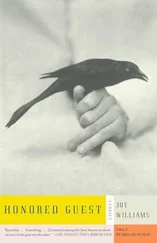Joy Williams - Taking Care
Здесь есть возможность читать онлайн «Joy Williams - Taking Care» весь текст электронной книги совершенно бесплатно (целиком полную версию без сокращений). В некоторых случаях можно слушать аудио, скачать через торрент в формате fb2 и присутствует краткое содержание. Год выпуска: 2010, Издательство: Vintage, Жанр: Современная проза, на английском языке. Описание произведения, (предисловие) а так же отзывы посетителей доступны на портале библиотеки ЛибКат.
- Название:Taking Care
- Автор:
- Издательство:Vintage
- Жанр:
- Год:2010
- ISBN:нет данных
- Рейтинг книги:5 / 5. Голосов: 1
-
Избранное:Добавить в избранное
- Отзывы:
-
Ваша оценка:
- 100
- 1
- 2
- 3
- 4
- 5
Taking Care: краткое содержание, описание и аннотация
Предлагаем к чтению аннотацию, описание, краткое содержание или предисловие (зависит от того, что написал сам автор книги «Taking Care»). Если вы не нашли необходимую информацию о книге — напишите в комментариях, мы постараемся отыскать её.
Taking Care — читать онлайн бесплатно полную книгу (весь текст) целиком
Ниже представлен текст книги, разбитый по страницам. Система сохранения места последней прочитанной страницы, позволяет с удобством читать онлайн бесплатно книгу «Taking Care», без необходимости каждый раз заново искать на чём Вы остановились. Поставьте закладку, и сможете в любой момент перейти на страницу, на которой закончили чтение.
Интервал:
Закладка:
Jim brought home the groceries and did all the buying. He had the six o’clock broadcast every evening and was back before eight. Lola played the part of an invalid. She took many baths, listened to the radio and slept in the afternoons. She sometimes sat on the trailer’s deck and looked through the thinning trees. The woods had become lean and haunted; only the magnolia trees stayed green and waxy like something into and past death. Fishermen drifted past on the river, flicking their long cane poles, drawing in panfish no bigger than a fist. They waved to Lola. She moved the pages of a book hastily and went inside. The place smelled of cigarettes and mice that wouldn’t be trapped. The paneled walls bent to the touch. She felt vulnerable, weakened, as though she were losing something day by day to the outside. She could be shattered. She could be broken. She tried never to go out there, but felt that there was no safety in the fragile trailer. In a storm, the woods creaked and the rain spun down on the roof like hail. She dressed carefully and watched her husband on television and drank wine until he came home. There was nothing to talk about.
“Driving home tonight,” he said, “I saw a dog trotting along the road with a loaf of bread in his mouth.”
One night in November, he told her that they were going to move to Atlanta two weeks before Christmas. “A new station, looking for new talent. A great opportunity,” he said. He had brought home champagne, shrimp and steak. He would make her happy again.
Lola was pale and her face had become rounder and all her muscles ached as though she had been doing violent exercise. She felt as though she were going to fall, even though she was already sitting down. Jim poured her a glass of champagne and went outside to grill the steaks.
That night, she couldn’t sleep. Their bedroom had one small window, useless because blocked by the branches of a sweet gum. It was imprisonment, like living in a cell. Lola heard the animals moving, the earth turning below her until just before dawn and then everything stopped. She walked down the narrow hall and saw the mist moving along the river toward the Gulf and a thin lemon lake of brightness rising from the crimson ground.
Three days later, on Thanksgiving, the hunting season began, with a terrific roar of shotguns throughout the woods around them. It was just after daybreak. Lola trembled and pressed her head beneath the pillow.
“If I go outside,” she said, “they’ll shoot at me. Just for sport.”
Jim was horrified. “Don’t be ridiculous. What a terrible thing to say!” He pulled away the pillow and stroked her face. “They’re not allowed to shoot across a road,” he said.
“They hit pets and automobiles and clothes drying on the line and the women hanging up the clothes,” she said calmly. “You hear about it all the time.”
“Lola, they are not going to shoot at you!”
She shook her head and watched him, waiting for something else. When he didn’t say anything right away, she got up and began to dress. The firing became more insistent and varied, rhythmless and roaming. The woods were foggy and like stone, and she imagined them calm and gaining strength from the hammering, converting it to a black and surly energy of their own that would be deployed someday, against her, against everyone.
Jim said, “It’s always bad on opening day. It won’t be like this again. The boys get bored or discouraged and the hunting slacks off, you’ll see.”
Beyond the trees, the river smoked. “I don’t care,” she shrugged. “It doesn’t bother me. I never go outside.” The woods had no power and made no sense. One could always cut everything down.
Of course, Jim had told her the truth. In the days that followed there were only scattered shots early in the morning and then a silence so intense that Lola felt she would never recover from it, not even in Atlanta.
Early in December, she began boxing dishes and cleaning out drawers, trying to throw away as much as possible. She wanted to abandon everything that had had anything to do with their life in the trailer but she knew that this was preposterous and that they couldn’t afford it. She gathered up an armload of clothes and plates and paperback books and, opening the door with her elbow, stepped out onto the deck. Parked in front of her was a red, sprung pickup truck with a large wooden box in the back for dogs. The box was unlatched and there wasn’t anything inside except some dirty straw and a plastic dish. Two boys were sitting on the hood of the truck with their backs to Lola, and when they heard the noise behind them, they jumped to the ground and faced her, crouching, with long grins that turned instantly into disappointed frowns. Their faces then gyrated wildly before collectively settling into detached somnolence. One boy rubbed at his eyelid as though he were shining up an apple. “Yo,” he said, nodding to Lola. He was bony, with thin dirty hands and close-cropped tan hair that clung to his head like a cap made out of a pecan shell.
Lola’s mouth was cold, as though she had been chewing ice. She kept raising her chin as she moved her tongue around in her mouth, until her head was tipped back so far she could barely see them.
The one that had spoken first said, “Name of Cale Barfield. This here,” he flapped his hand at his companion, “J.J. Leape.”
J. J. stamped his boots on the ground and moved his head up and down curtly as though he were afraid someone was going to see him do it. He wore a Navy flight jacket and had incredibly clear blue eyes, like a baby’s.
“I don’t know what you’re doing here,” Lola said. “I couldn’t care less who you are, but I certainly would like to know what you’re doing here.”
“We lost our dawgs,” Cale said serenely, pulling himself back up on the hood of the truck. “Three. One blue,” he spread his hand before his face and waggled a finger. “One black ’n’ tan and one dawg.”
“I couldn’t care less what you are doing here,” Lola said and then stopped, confused. She still had her arms full of trash and she pressed it closer to her chest. “You’ve got to leave.” Her voice seemed to be coming from somewhere behind her.
“We didn’t know no one was here. We thought hit a summer camp all closed up. Curtains all closed up. Nothing here. No cars or gear nor nothing. Looks closed to me, don’t hit to you, J.J.?”
The boy with the blue eyes slammed the door of the cab shut and sat down on the running board. Hanging in the rear window were two rifles and a shotgun. J.J.’s eyes looked crayoned in. He looked at Lola so carelessly that she felt she wasn’t being looked at at all.
“I live here,” she said. “And my husband lives here.” She began backing into the trailer. She was afraid to look down at herself or where she was going because she thought that if she did, she would find something dreadfully disarranged.
“If we leave the truck setting in one place, them dawgs will find hit,” Cale said.
“No,” she said.
“Oh yeah, that’s shor right,” Cale smiled.
She dropped what she was carrying into a chair and slammed the door shut and locked it. Then she poured herself a drink and walked back to the bathroom and closed and locked that door and sat on the edge of the tub and sipped her drink. She was a nice person! She was clean. She didn’t throw things out the car window. Her mouth quivered on the rim of the glass. At her feet was a newspaper. A headline said
MOTHER THINKS SON IN GIANT’S COMPANY
She finished the drink and unlocked the bathroom door and walked down the hallway to the kitchen. Cale and J.J. were standing in the living room. Even before she saw them, she could smell the cold air of the woods and their muddy woolen clothes.
Читать дальшеИнтервал:
Закладка:
Похожие книги на «Taking Care»
Представляем Вашему вниманию похожие книги на «Taking Care» списком для выбора. Мы отобрали схожую по названию и смыслу литературу в надежде предоставить читателям больше вариантов отыскать новые, интересные, ещё непрочитанные произведения.
Обсуждение, отзывы о книге «Taking Care» и просто собственные мнения читателей. Оставьте ваши комментарии, напишите, что Вы думаете о произведении, его смысле или главных героях. Укажите что конкретно понравилось, а что нет, и почему Вы так считаете.












